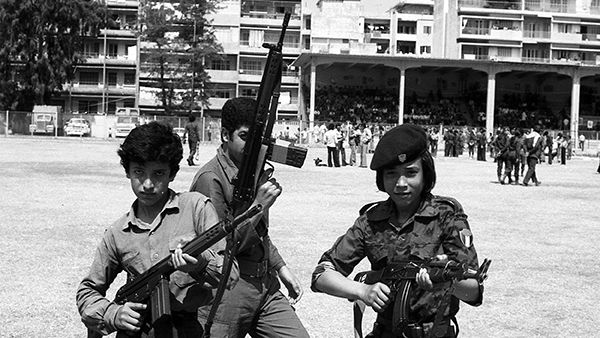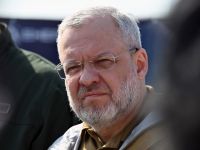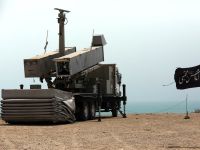German TV documentary “Lebanon – Borders of Blood” shows the historical struggle that shaped modern day Lebanon, and the agony that accompanied and followed the process. The film is crucial to understanding the small country that is now enduring a severe crisis that has brought it to the brink of catastrophe. The Arab Weekly attended a recent screening of the film, which will premier November 17 on Germany’s ARTE culture channel.
The film’s title – both in English and Arabic – is based on quotations from former Lebanese President Amine Gemayel and ex-French President Francois Mitterrand, film director Duki Dror revealed to The Arab Weekly.
TV rating figures of last night airing - Lebanon Borders of Blood: Arte France - 505k viewers Arte Germany - 338k viewers
Posted by Duki Dror on Wednesday, November 18, 2020
The film, originally titled “Libanon: Gefangen in Chaos” was produced by German TV networks ARTE and WDR.
Although Germany was never involved in Lebanon‘s long civil war, it was plagued by its causes and precursors through cooperation, arming and training that took place between some Palestinian factions and the German leftist terrorist organisation Baader Meinhof (Red Army Faction). Germany was also at the centre of one of the worst chapters oft the Palestinian-Israeli conflict, when the Palestinian Black September organisation blew up a plane carrying an Israeli sports delegation participating in the 1972 Munich Olympics at Munich Airport.
The film opens with the huge blast that hit Beirut port in August 2020; then the story unfolds through a series of historic crises caused by heads of state, sects and militias. The Lebanese themselves have, at one point or another, contributed to the country’s tragic history, as well as the Palestinians, French, British, Iranians, Syrians, Americans, Israelis, Iraqis and others.
The film traces the bloody stages of Lebanon‘s 15-year civil war through documentary scenes, connected by the voice of a narrator and authenticated by evidence provided by influential figures who took part in shaping or documenting the country’s path from 1975 to 1990.
On September 1970, Jordan’s King Hussein waged a war against the Palestine Liberation Organisation (PLO) that was stationed inside the kingdom at the time. The Palestinian armed factions were forced to leave Jordan, and Lebanon was their last refuge.
The film narrates how the evacuated Palestinian factions settled in southern Lebanon, where they began to wage guerrilla operations against Israel. In response, Israel invaded south Lebanon in 1978. This short invasion ended after three months.
Lebanon’s situation deteriorated thereafter, as too many players came onto the scene. Israel launched another major invasion of Lebanon in 1982, pushing the PLO’s leadership and all other Palestinian fighters from Lebanon.
This was only one of several historical chapter explored in the documentary.
Ten characters take turns filling in the gaps of the bloody narrative. The first is former Lebanese President Amine Gemayel (1982-1988), who was elected to office after his brother Bashir was assassinated the previous month. He gives deep insight into the country’s political landscape: “Lebanon is a mosaic of parties, ethnicities. It’s the weakness of Lebanon and the strength of it,“ he says.
Hanin Ghaddar, the sister of a Hezbollah fighter and a journalist for Lebanese newspaper As-Safir, sheds light on the evolution of Hezbollah inside Lebanon‘s fractured political system, as well as Iran‘s growing influence throughout the Middle East.
At one point, the camera zooms in on a natural scene of Lebanon’s crescent-like curvature around the Mediterranean coastline, with the film’s narrator resuming his story-telling in the backdrop.
On the Palestinian side, the camera shows Imad Shakur, a long-time confidante of the late Palestinian leader Yasser Arafat. Shakur, who was Arafat’s chief adviser on Israeli affairs during and after the Lebanese war, tells the inside story of Palestinian leaders‘ evacuation from Beirut.
On the German side, the camera shows director Volker Schlondorff, who filmed the movie “Circle of Deceit,” an adaptation of Nicolas Born’s novel of the same name about a war reporter on assignment in Lebanon in 1981 amid the smouldering civil war. Schlondorff had recently won an Oscar for his film “The Tin Drum.”
One scene is filmed from locations in Beirut that are now completely destroyed, in contrast to previous scenes of a happy capital during its peak in the 1960s and early 1970s, Schlondorff says: “In 1962 Beirut was truly the Switzerland of the Orient. There were the nightclubs, there were the expensive restaurants, there were the expensive hotels, which, by the way, we could not afford.“
American journalist Thomas Friedman, winner of the Pulitzer Prize for his coverage of hostilities in Lebanon in his book “From Beirut to Jerusalem” is also interviewed in the film. His comments on the scene enrich the narration.
Ryan Crocker, a leading American diplomat who began working in the Middle East in the 1970s and served as US Ambassador to Lebanon between 1990 and 1993, also weighs in and analyses the film’s events. Former US President George W. Bush once called him “America‘s Lawrence of Arabia.”
On the Israeli side, the film features former Israeli Foreign Minister Tzipi Livni, among other figures. The inisights of key figures of his caliber give the film weight and credibility.
The film reaches its climax in a scene showing explosions at the US Embassy and Marine headquarters in Beirut, attacks that revealed Iran’s intervention in the country via its proxy Hezbollah.
The film’s closing scene returns to the catastrophic Beirut port blast this year and highlights the country’s current tumult, suggesting it stands on the verge of another civil war influenced by international powers.
Dror is on of Israel’s most prolific documentary filmmakers, known for works such as “Raging Dove” (2002), “Down the Deep, Dark Web” (2016) and “Inside the Mossad” (2017). Reinhardt Beetz is a German filmmaker who has worked for two decades as an editor, producer and director of TV networks ARD, ZDF, ARTE, NDR, MTV and other international broadcasts. The latter also worked with American Dana Wolfe, a five-time Emmy Award-winning journalist and television producer.
This article has been adapted from its original source.








